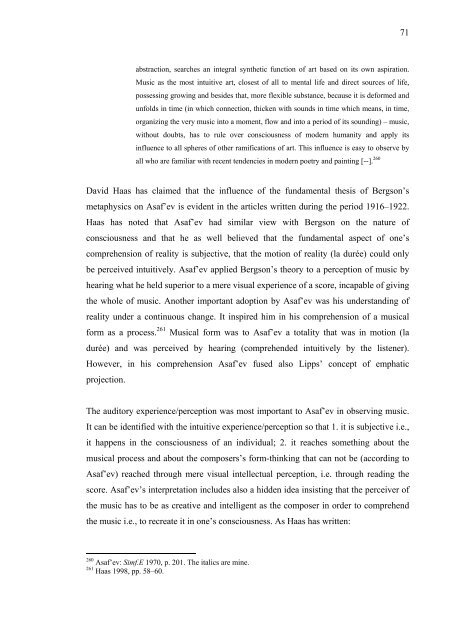Boris Asaf'ev and the Soviet Musicology - E-thesis
Boris Asaf'ev and the Soviet Musicology - E-thesis
Boris Asaf'ev and the Soviet Musicology - E-thesis
Create successful ePaper yourself
Turn your PDF publications into a flip-book with our unique Google optimized e-Paper software.
abstraction, searches an integral syn<strong>the</strong>tic function of art based on its own aspiration.<br />
Music as <strong>the</strong> most intuitive art, closest of all to mental life <strong>and</strong> direct sources of life,<br />
possessing growing <strong>and</strong> besides that, more flexible substance, because it is deformed <strong>and</strong><br />
unfolds in time (in which connection, thicken with sounds in time which means, in time,<br />
organizing <strong>the</strong> very music into a moment, flow <strong>and</strong> into a period of its sounding) – music,<br />
without doubts, has to rule over consciousness of modern humanity <strong>and</strong> apply its<br />
influence to all spheres of o<strong>the</strong>r ramifications of art. This influence is easy to observe by<br />
all who are familiar with recent tendencies in modern poetry <strong>and</strong> painting [--]. 260<br />
David Haas has claimed that <strong>the</strong> influence of <strong>the</strong> fundamental <strong>the</strong>sis of Bergson’s<br />
metaphysics on Asaf’ev is evident in <strong>the</strong> articles written during <strong>the</strong> period 1916–1922.<br />
Haas has noted that Asaf’ev had similar view with Bergson on <strong>the</strong> nature of<br />
consciousness <strong>and</strong> that he as well believed that <strong>the</strong> fundamental aspect of one’s<br />
comprehension of reality is subjective, that <strong>the</strong> motion of reality (la durée) could only<br />
be perceived intuitively. Asaf’ev applied Bergson’s <strong>the</strong>ory to a perception of music by<br />
hearing what he held superior to a mere visual experience of a score, incapable of giving<br />
<strong>the</strong> whole of music. Ano<strong>the</strong>r important adoption by Asaf’ev was his underst<strong>and</strong>ing of<br />
reality under a continuous change. It inspired him in his comprehension of a musical<br />
form as a process. 261 Musical form was to Asaf’ev a totality that was in motion (la<br />
durée) <strong>and</strong> was perceived by hearing (comprehended intuitively by <strong>the</strong> listener).<br />
However, in his comprehension Asaf’ev fused also Lipps’ concept of emphatic<br />
projection.<br />
The auditory experience/perception was most important to Asaf’ev in observing music.<br />
It can be identified with <strong>the</strong> intuitive experience/perception so that 1. it is subjective i.e.,<br />
it happens in <strong>the</strong> consciousness of an individual; 2. it reaches something about <strong>the</strong><br />
musical process <strong>and</strong> about <strong>the</strong> composers’s form-thinking that can not be (according to<br />
Asaf’ev) reached through mere visual intellectual perception, i.e. through reading <strong>the</strong><br />
score. Asaf’ev’s interpretation includes also a hidden idea insisting that <strong>the</strong> perceiver of<br />
<strong>the</strong> music has to be as creative <strong>and</strong> intelligent as <strong>the</strong> composer in order to comprehend<br />
<strong>the</strong> music i.e., to recreate it in one’s consciousness. As Haas has written:<br />
260 Asaf’ev: Simf.E 1970, p. 201. The italics are mine.<br />
261 Haas 1998, pp. 58–60.<br />
71

















